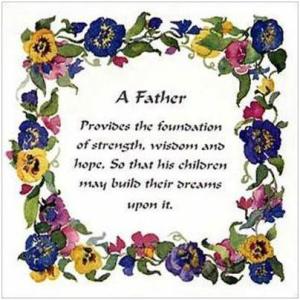Father’s Day
Honoring and Celebrating our Fathers
Father’s Day in the United States is celebrated with a lot of enthusiasm and great fanfare on the third Sunday of June. It is a day to celebrate and honor our fathers…to reflect on the invaluable role fathers play in building the character of children and in the development of the nation. Father’s Day has also become a day to pay tribute to grandfathers, stepfathers, and other men who are like fathers.
Father’s Day History
Some people claim that Father’s Day began in West Virginia and some people place its origin with a Mr. Meek who organized a Father’s Day celebration in Chicago in the early 1900s. Some scholars believe that the origin goes as far back as nearly 4,000 years to a boy named, Elmesu who carved a message of good health and long life to his father on a card made out of clay. Historians, however, consider Sonora Louise Smart Dodd of Spokane, Washington as the first person to think up the holiday.
After listening to a Mother’s Day sermon in 1909 Ms. Dodd pondered if there is a day honoring mothers why not for fathers? Encouraged by the love she received from her father, William Smart, a Civil War veteran who single-handedly raised her along with her five siblings, Ms. Dodd worked hard to make her idea a reality. Inspired by Ms. Jarvis’ struggle to promote Mother’s Day, Ms. Dodd began rigorously campaigning to celebrate Father’s Day in the United States. She gained support from the Spokane Ministerial Association and the local YMCA, as a result Spokane celebrated the first Father’s Day on June 19, 1910.
Although there was initial hesitation, the idea of a day to honor and celebrate fathers gained gradual popularity and Father’s Day came to be celebrated in cities across the United States.
Making it Official
As early as 1913, individuals, organizations, and even some states began lobbying Congress to declare Father’s Day a national holiday. In 1916, President Woodrow Wilson began heavily promoting making Father’s Day official, but he was never able to muster enough support from Congress. It was not until 1924, when President Calvin Coolidge signed a resolution to “Establish more intimate relations between fathers and their children and to impress upon fathers the full measure of their obligations.”
Finally in 1966, President Lyndon Johnson signed a presidential proclamation that made the third Sunday of June, Father’s Day. Six years later, in 1972, President Richard Nixon made Father’s Day a permanent national holiday.
Significance of Fathers
When the push for a Father’s Day began in the early 1900s the role of fathers was relegated to a secondary status, as compared to a mother who was regarded as the sole nurturer of the children. We all know that a father is just as important for the children as the mother. As with their mother, children depend on their father for their emotional, spiritual, physical, and social well-being. For daughters, a father is the ideal man in the world and also the first man they adore, while for sons, a father is an idol and the strongest man they aspire to emulate.
Traditionally a father has been seen more as a provider and guide for children – the scenario has significantly changed in our family culture today. Today both parents are working outside the home, fathers are more involved than ever in the raising of their children, and many have taken on more of a “Mr. Mom” role. This cultural change is helping to strengthen the father-child relationship, consequently enhancing the emotional development of a child and building a stronger family bond.


Reblogged this on R.B.Bailey Jr's Space and commented:
I like this!
Awesome – thank you, appreciate it! ~Connie
Sure
Enjoyed this very much.
Glad you enjoyed it – thank you for taking the time to comment ~Connie
I liked your version better than mine.
Awww…that is very kind of you to say – thanks for the follow and taking the time to pop in and comment ~Connie
what a lovely post!
Thank you – glad you enjoyed it! Appreciate you taking the time to comment and let me know ~Connie
Thanks for the visit to my site and the follow,
Would you be writing about all the prominent celebrations? That would be interesting.
You are welcome – Yes, I typically try to write something related to any of the major holiday celebrations…glad you enjoyed the Father’s Day one.
I enjoyed learning about the history of Father’s Day. Thanks for a great post.
Thank you – so glad you enjoyed it! Appreciate you taking the time to comment.
Very soon this website will be famous among all blogging
users, due to it’s pleasant posts
Thank you – Glad you are enjoying my posts…